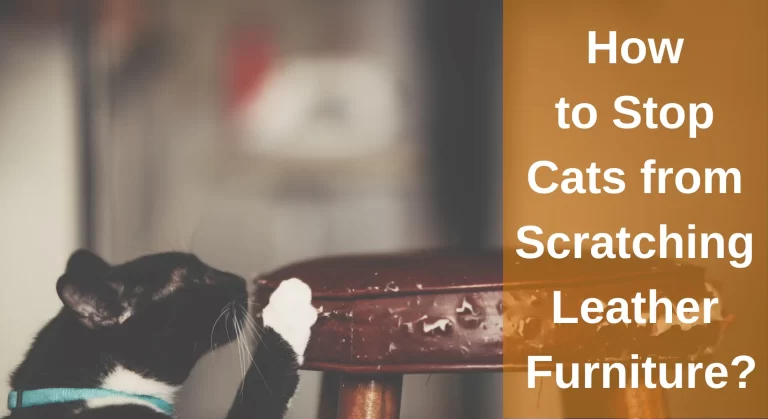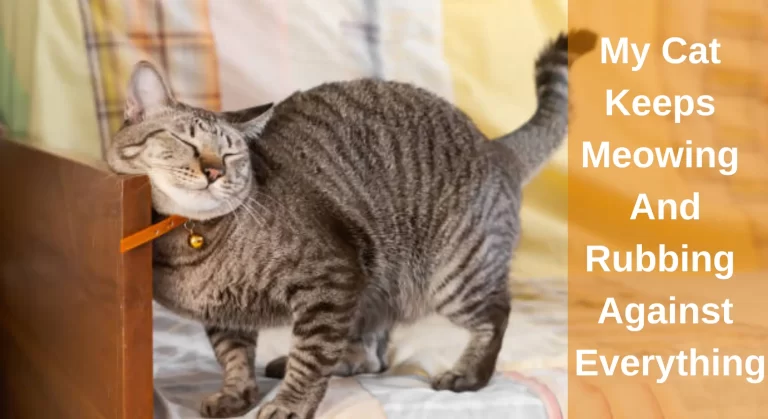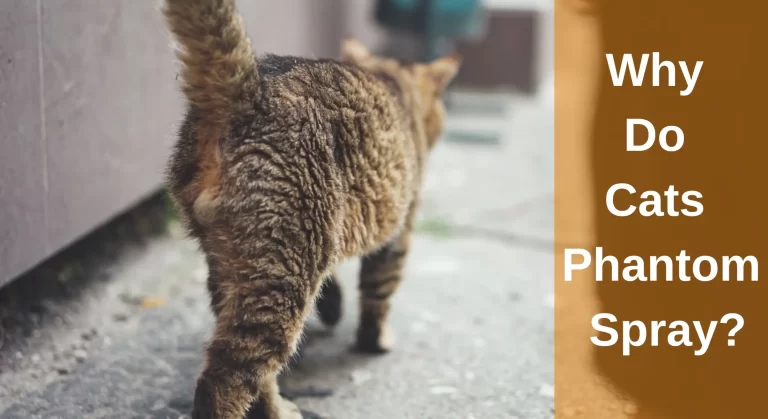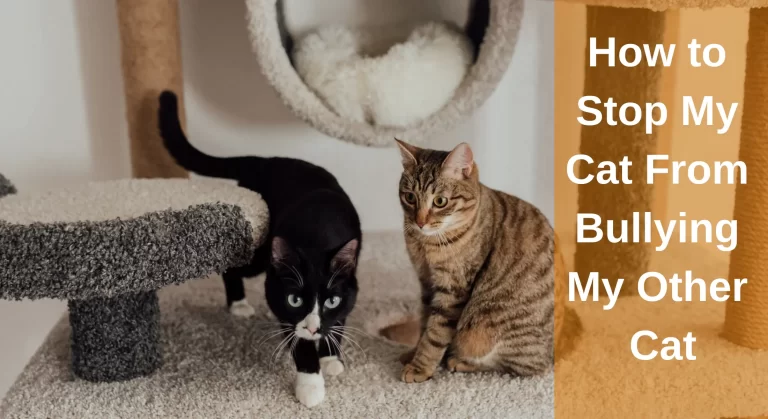Why Do Cats Go To Other Houses? Things You Need To Know
A cat can survive anywhere if they’re properly fed; however, this isn’t true. Cats are smarter than you think, and they’re aware of the differences between visitor home and their own. Why do cats go to other houses? They can frequently visit strangers’ homes for a variety of reasons.
Cats have curious nature and like to explore the aromas and views of different houses. They can establish their dominion in visitors’ homes if no they don’t have any feline; this may cause trouble for neighbours. Moreover, if your cats are continuously provided with delicious meals, love, and care, they’ll continue to visit strangers’ homes. So, it would be best if you stopped your cat by either talking with your neighbours or in some other way.
You’re at the right spot if you’re facing this problem. In this post, we’ll explain your cats’ needs, their reasons for leaving your home, and how to stop them from going to others’ homes. Let’s continue to read this post:

Why Do Cats Go to Other People’s Houses? Why Do Cats Visit Other Homes?
Cats frequently break into other houses, particularly your neighbours’. Many cat owners find this behaviour annoying, while others enjoy it. Someone who’s allergic to cats hates when other cats visit their homes.
It can be challenging to stop a cat from doing this pastime. Cats visit your neighbours because they’re:
- Naturally exploring pets.
- Attempting to become dominant in new places.
- Seeking more delicious food.
- Looking for a friend.
- In need of peace and quiet place.
- Getting older, their brain doesn’t function properly.
- Facing a stressful situation.
Do Cats Like Visiting Other Houses?
Your cat loves to visit others’ homes if they feel more comfortable over there. Your cat needs a compelling incentive to come back to you. There are many possible reasons of your cat loves to visit your neighbour’s home:
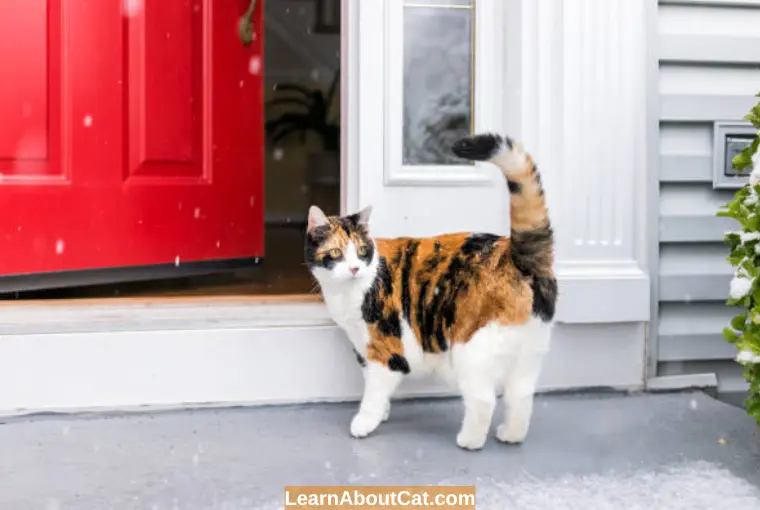
- It mostly happens when you’re moving to your new house.
- It might be due to when you get married and your spouse owns your house.
- Cats may feel others’ homes are new and thrilling.
- They may create a close relationship with other owners.
- They may get their favourite delicious meals over there.
- They get extra attention, hugs, and love.
Can Cats Go Back and Forth Between Houses?
If your cat loves to live in both homes, it’s because they’re familiar with both places, or they may get closer to other owners. Moreover, it also depends on your cat’s nature and the circumstances for moving in and out of both homes.

For instance, if your cat has a nervous nature, then it’s advised to keep another cat or pet sitter at your home to create a friendly environment.
If your cat has a calm and relaxing nature, you must enhance your living standard to make them more comfortable at home.
However, make sure that your cat is aware of both houses’ environments. So that they’ll easily return to your home instead of wandering off.
How to Stop My Cat Going to Another House?
If you don’t stop your cat from visiting a neighbour’s house, she may leave your home permanently and remain there. Luckily, I’ve mentioned a few tips that will help you to prevent your felines from leaving your house:

- Create a stress-free environment for your felines.
- Provide them with delicious meals on time. Try to make a proper food schedule and feed them 5 times small meals all over a day. But don’t overfeed them.
- If you’re busy with routine, don’t leave them alone. Ask a friend to visit your home regularly.
- Treat your cat with more affection and give them treats when they show nice behaviour.
- Give your felines an entertaining environment, including cat trees, toys, or another cat for giving company.
- Train your cat properly not to leave your home.
- Talk to your neighbours; don’t let your cat inside.
How Do I Stop Someone Else from Feeding My Cat?
If you’re aware of the person who’s providing food to your cat, you can chat with them friendly and stop them by doing this. First, introduce yourself and then explain to them that your cat is following a specific diet plan, so you mustn’t give them extra food.

Even if your cat isn’t on a special diet, you have the right to stop them from feeding your cat because your cat may become obese, and it’s bad for her.
If you’re unaware of the person giving your cat free treats, hang a paper collar or tags on its neck that says she mustn’t be given any extra food. She’s living in a caring environment. That’s it!
What Does It Mean When a Cat Shows Up at My Door?
Have you asked yourself why cats visit different homes? The answer to this question will let you know what your felines want. The following situations will cause another cat to show up on your doorstep:

- Cats have the desire to explore things, and this nature is ingrained into their DNA. So, if anything in your home initiates a cat’s curiosity, they’ll probably explore it.
- Cats have a dominant nature, and they always want to take the attention of everyone, even your neighbours too. So, if your neighbour’s cat approaches your doorstep, then she may want your attention or to provide them with what they want.
- Cats are social pets; that’s why they may approach your door to create a friendly bond with you and to play with you.
- Cats have a dominant nature, and sometimes the boundaries of their dominance may go beyond their owner’s home boundary. So, in some cases, cats may also come to your door to mark their territory in your home.
What Does it Mean When a Cat Hangs Around Your House?
Cats often won’t hang out around your home without any major cause. The cat enjoys hanging out at your house for a variety of reasons; either it’s because of you or some following reasons:

1. Food Source
Cats may wander outside your home because you might be preparing a meal, so they’re at your home in need of food.
2. Secure Environment
Cats also hang out in your house because they may feel your home secure. Your home may include a fence around your property so that foxes can’t get in. Moreover, a big tree in your home may attract cats, as it’ll help them to be safe from dangerous stray cats by climbing it. Also, a roof in your home makes them feel safe as they can cover their heads in a violent storm.
3. In Need of Shelter
If a cat arrives at your home on a cool, gloomy, or stormy night, then he may need shelter.
4. Need Affection
Sometimes a cat may also wander around your home for a companion, affection, or care.
5. The Cat may be Lost
A lost cat may also wander around the house. Check the cat’s collar, as it may contain the caretaker’s contact details. Lost cats aren’t afraid of strangers and will likely come to your home if you provide them with food.
How To Tell if a Cat is a Stray?
Sometimes, you may be in doubt that some stray cat is wandering in your backyard. But, most people are unaware of how to examine if a cat wandering in their home is a neighbourhood cat or a stray cat. So, here you can find some tips to determine whether a cat is a stray or domestic cat:

- Roaming cats: Roaming cats may come to your home while wandering in the street or from a nearby neighbourhood. These cats are friendly, and they rub up with you. But they’ll return to their home on time and keep themselves clean.
- Stray cats: These cats are strayed off the main street. They are fearful and attempt to run away from their owner. They’ll approach neighbours and may appear dirty and weak.
- Feral cats: These cats usually lived in the wilderness or abandoned their homes a long time ago. They fear facing humans, and they may attack you upon sudden contact. They hide in daylight and fight with other cats.
What to Do When a Stray Cat Comes to Your House?
As previously said, a stray cat usually visits your home to find refuge, meals, or water. So, here are a few guidelines that you should follow when a stray feline knocks on your door.

1. Provide them with Good Food
Greet the cat gently and softly if it appears friendly. Give her water and a meal in a bowl. But if the stray cat is feral, then keep a distance from him as he may hurt you. But if you once provide them with food, they’ll come for more.
2. Give it a Comfortable and Secure Location
Provide the cat with shelter if it’s rainy or freezing outside. Provide them with a cosy comforter or crumbly towels to lay on, and place it in a secure location apart from your kids or other canines. But avoid petting a fearful or angry cat until it relaxes in and becomes comfortable.
3. Verify its Identity
When a stray cat enters your home joyfully, the first thing is to see if it’s carrying a collar with its caretaker’s contact details, then contact them right away. In the meanwhile, prevent your pets from that cat as he may carry worms, lice, mites, insects, or other illnesses.
4. Hang a Paper Collar Around their Neck
If you want the stray cat to meet its owner, place a paper tag around his neck along with your phone number. This will let other people know whether a cat is a stray or lost.
Frequently Asked Questions
Do cats remember different houses?
Yes, cats possess a strong sense of smell and vision that they use to memorize different places’ aromas or architecture. So, your cat may remember your neighbour’s home because of its specific aroma.
Why does my Neighbors cat visit me?
Your neighbour’s cat may visit you because of the following reasons:
1. Extra food
2. Affection, cuddles, or attention
3. For playing or chatting with you
4. In seek of a comfortable environment
5. To play with your cat or children
5. To explore something in your home
Why do cats find new homes?
There are a variety of reasons why cats move from one home to another, including failure to meet their basic needs. Cats can be fearful for their safety when they are exposed to stress-causing events such as an arrival of a new person, a pet in the house, or even a move.
Also, cats seeking better homes and food when they are being abused to a point where they can no longer handle it will seek out better living conditions in order to survive.
Wrap UP!
The difficulty of owning cats doesn’t just include cats getting into other people’s houses. You have to take your feline from your neighbour’s home and discuss the situation with them to find a solution. By giving your cat all that it requires, such as meals, affection, and a tension-free atmosphere, you can reduce the likelihood of your cat visiting your neighbours’ homes.
Also, watch out for neighbours giving your cats food; if this occurs, let them know you restrict your cat’s food intake.
Related Posts:
Who is Isabella?
My name is Isabella, and I am a dedicated and knowledgeable cat enthusiast. With years of experience caring for cats and a deep love for felines, I made a mission to help other cat lovers navigate the challenges of cat ownership.

